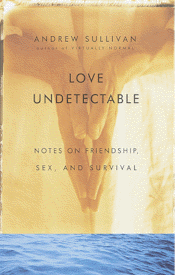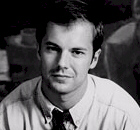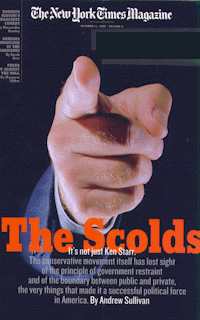 |

|
|
By Andrew Sullivan |
|
Book Review By Michael Warner
From In These Times Magazine Love Undetectable: Notes on Friendship, Sex and Survival by Andrew Sullivan, Knopf , 252 pages, $23. Not Straight but Still Narrow
That Andrew Sullivan tells this story of himself says something about the very personal candor that is one of the strengths of Love Undetectable. The boy's almost paranoid fear and guilt leads him, as Sullivan puts it, to become "brittle, neurotic." In adolescence, he compensates for the tyranny of this God-like superego with the classic pattern that Freud called anal retentive: extreme orderliness, compulsive cleaning, obstinacy, control. (Sullivan discusses Freud with sympathy, and at some length.) Given this background, which may sound familiar to many of us with religious childhoods, it is not surprising that Sullivan encountered sex as an uncontrollable, dangerous taste of a long-denied freedom and contact. But in the end, it's the superego, that inescapable watching eye, that seems to have won out--much more than the author seems to realize--both in his former career as editor of The New Republic and in this new book. The book consists of three connected essays: on AIDS, gay psychology and friendship. Running through each is a narrative so scarred with pain that the book feels more like a confession than anything else. In the first piece (interrupted by a religious epiphany that sounds rather like an acid trip), Sullivan gives us a chilling account of his own sense of fear and despair after testing HIV-positive, of the dilemmas he faced over disclosing his status, of his long and still unresolved struggle with guilt and shame over sex. In the second, he tackles his nagging fear that he is not, as he puts it, "normal"--that no matter how out and affirmative, there will still be something pathological in homosexuality. And in the final essay, he describes the comfort and strength he found in friendship, particularly in his unsettling bond with a man named Patrick, who died of AIDS. Woven into these confessional stories is a polemic. AIDS, Sullivan argues, has left gay men more mature, ready to leave behind the pathologies of sex and seek the higher ground of marriage and friendship. Sometimes, it must be said, the polemic works. The middle piece mounts a very powerful rebuttal to the right-wing account of gay pathology in what is called "reparative therapy." It works because Sullivan takes the time to walk through the right-wing arguments. Sullivan at his best is capable of writing with more humanity than his critics often credit him for. Indeed, one can find brief passages throughout the book in which something like an anti-Sullivan seems to have wrestled his laptop away from him. "The way our culture has set up the debate--between puritans and libertines, between indiscriminate supporters of promiscuity and prophets of sexual doom--does no justice to life as it is actually lived, and to the human beings trying to navigate through it." True enough. One wishes only that Sullivan had remembered this himself. Again, while refuting pathologizing accounts of homosexuality, he makes a refreshing appeal to experience, noting that the gay men in his acquaintance are so different that no psychological account of homosexuality will do justice to their variety: some effeminate, some not; some close with their mothers or hostile to their fathers, others the reverse; some uninterested in monogamy, others desperate for it; some who feel conflict between committed love and promiscuous sex, others for whom these seem easily complementary. "All human types," Sullivan concludes, "are foiled by human reality." But this insight disappears whenever Sullivan wants to make his own generalizations.
He complains that people see him as intolerant, stigmatizing and condescending toward "leather daddies and lipstick lesbians, the drag queens and diesel dykes, the purveyors and marketers of camp and irony." How unfair! "Nothing," he claims, "could be further from the truth." But in the very next sentence--the sentence that is supposed to show how he is not intolerant, stigmatizing or condescending--he refers to these people as "products of a long history of isolation and marginalization." And, he goes on, "insofar as these cultural expressions are also products of deep and searing anxiety, of the inability to be a publicly gay man or woman except as a caricature of one gender or another, then they are no more to be clung to than excruciating racial stereotypes. There is a difference between a culture of difference and a rationalization of pain." Sullivan cannot refrain, even for the space of this paragraph, from pathologizing those whose pleasures and identities differ from his own. What reason does he advance for his judgment? What is the store of expertise that allows him to declare others' pleasures to be "a rationalization of pain"? The answer turns out to be his own pain. When he writes that, as a Catholic, he has "always felt the spiritual and sexual lives to be, at the deepest level, in conflict," you have a sense of the problem. He seems incapable of imagining that for others this might not be true, let alone that his own over-identification with moral authority might itself be seen as a rationalization of pain, or that his description of his own religious life would often seem to fit his definition of "pathological" more closely than does the gay culture he denounces. What is by his own account a damaging case of Catholic guilt has been taken as a universal law. Sullivan thinks his opponents call him a "gay conservative" simply because "it is easier to label than to listen." But he shows plenty of willingness to label in return, and little sign of having read the works of those whom he so smugly dismisses. "There is little doubt," he declares, drawing himself up in full pomp, "that the ideology that human beings are mere social constructions and that sex is beyond good and evil facilitated a world in which gay men literally killed each other by the thousands." This is hardly worth arguing against. Mere social constructions? Literally killed each other? In the same passage, Sullivan blames "gay liberationists" for believing that "saving lives was less important than saving a culture of 'promiscuity as a collective way of life,' when, of course, it was little more than a collective way of death." Since the quoted phrase is mine, I can tell you that Sullivan quotes it from a passage in which I was describing how he tends to stigmatize gay men who have sex, and here he's done it again. He imagines a false choice: saving lives or saving promiscuity. But what if gay male sexual culture was and remains a resource that has allowed people to shift over to safer sex--together, publicly and creatively--as a way of saving lives? To call it "a collective way of death" is simply to ignore safer sex, and the role that a promiscuous culture played in making it possible. Sullivan implies that all promiscuity is unprotected, that it is all risky, that it is homicidal and that it is always incompatible with intimacy and love.
In the last chapter, Sullivan rightly emphasizes the importance of friendship in gay culture. But this could be seen as a portrait of intimacies that are an alternative to marriage. Sullivan thinks that "sex between friends is something to be avoided at all costs," that love and friendship are wholly distinct. But for many gay men, tricks become friends, friends cross into sex and back again, both tricks and friends can become lovers, ex-lovers can be friends or even tricks, and friends who don't have sex can bond over their common sexual lives. Some of us have relations simultaneously that run the gamut from long-term lover to fuckbuddies, surrounding us with a web of intimacies that is also a sexual culture. All of this is utterly falsified by Sullivan's idealization of marriage as the only valid context for intimacy, love and sex. And as usual when Sullivan talks about marriage, he treats the relation and the legal regulations as one and the same. The implication is that passage of some new laws will make it easier for gay men to find boyfriends. In the end, as this tortured and un-selfknowing book veers from confession to sermon, it leaves its most human insights behind. Sullivan has a large following, mostly of men who share his sense of isolation and of a lifelong war between shame and yearning. But Sullivan's solution to these problems is a version of morality that remains too restricted and too willful to be much more than moralism. It perpetuates the cycle of shame and yearning, and this tension is audible in the frustrated piety and simmering resentment of Sullivan's prose. For those who are not already among the converted, the book's flaws are hardly undetectable. Michael Warner is Professor of English at Rutgers University, the editor of Fear of a Queer Planet, and author of several books on American literature. He has written for the Village Voice, the Nation, the Advocate, Poz, and other journals. He lives in Brooklyn.
Courtesy of In These Times, a biweekly alternative newsmagazine
|
© 1997-98 BEI
 Imagine an 8-year-old boy going to his mother and asking "if God really
knew everything about you, if He could see into every part of you and know
exactly what you were thinking and feeling." And when she answers yes, the
boy replying, "Then there's no hope for me, Mum."
Imagine an 8-year-old boy going to his mother and asking "if God really
knew everything about you, if He could see into every part of you and know
exactly what you were thinking and feeling." And when she answers yes, the
boy replying, "Then there's no hope for me, Mum."
 Andrew Sullivan
Andrew Sullivan  Sullivan prides himself on clarity, consistency and rigor of argument. But
these are not, in fact, his strong points. The book is riddled with
unexamined terms (such as "normal"), logical leaps and glaring
contradictions. Sometimes the argument is simply irresponsible. He writes
as though AIDS were over, even though he takes pains to acknowledge that
AIDS is still going on, that gay men continue to get infected, that the
vast majority of people with HIV have no access to the expensive drugs,
that many of those lucky enough to get them are seeing the virus rebound.
"When Plagues End" is, in fact, the title of the book's first essay, a
different version of which ran in The New York Times Magazine. After
Sullivan's piece appeared, contributions to AIDS organizations dropped
precipitously. Gay Men's Health Crisis now faces a $2 million shortfall
for this year, and has laid off scores of people in desperation. Why?
Because the organization's donors--many of them just the sort of
well-heeled gay men who, like Sullivan, reap the full benefits of the new
treatments--have come to the same conclusion: the plague is over. For
them.
Sullivan prides himself on clarity, consistency and rigor of argument. But
these are not, in fact, his strong points. The book is riddled with
unexamined terms (such as "normal"), logical leaps and glaring
contradictions. Sometimes the argument is simply irresponsible. He writes
as though AIDS were over, even though he takes pains to acknowledge that
AIDS is still going on, that gay men continue to get infected, that the
vast majority of people with HIV have no access to the expensive drugs,
that many of those lucky enough to get them are seeing the virus rebound.
"When Plagues End" is, in fact, the title of the book's first essay, a
different version of which ran in The New York Times Magazine. After
Sullivan's piece appeared, contributions to AIDS organizations dropped
precipitously. Gay Men's Health Crisis now faces a $2 million shortfall
for this year, and has laid off scores of people in desperation. Why?
Because the organization's donors--many of them just the sort of
well-heeled gay men who, like Sullivan, reap the full benefits of the new
treatments--have come to the same conclusion: the plague is over. For
them.